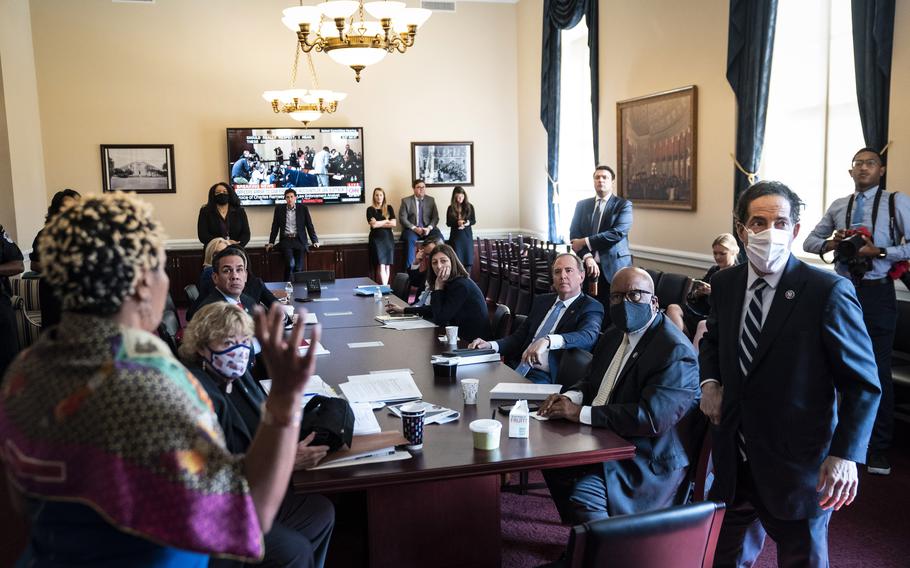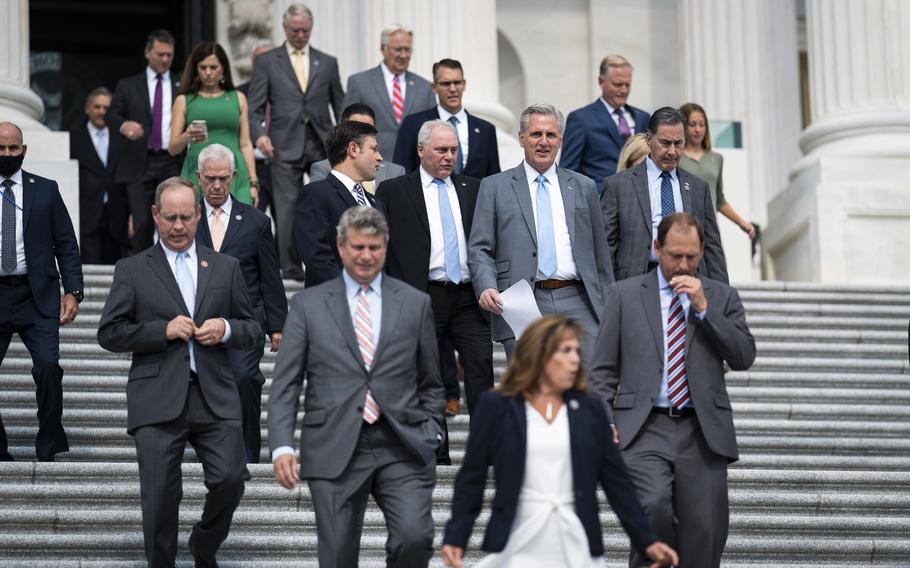U.S.
Jan. 6 committee faces unprecedented choice of whether to call Republican lawmakers to testify
The Washington Post July 31, 2021

Members of the House select committee on the Jan. 6 attack huddle in a private meeting room moments before the start of their first hearing with Capitol Hill police witnesses on Capitol Hill on July 27, 2021 in Washington. (Jabin Botsford/The Washington Post)
WASHINGTON — The leaders of the House committee investigating the Jan. 6 attack on the Capitol are promising a vigorous inquiry into a day they have called a threat to American Democracy, which could lead to an unprecedented legal and political showdown over how to force members of Congress to take the witness stand.
Several congressional Republicans have admitted to having some contact with former president Donald Trump during the insurrection or in the days leading up to it, making their testimony potentially key to the panel’s stated goal of being “guided solely by the facts.”
The Jan. 6 panel’s chairman, Rep. Bennie Thompson, D-Miss., said in an interview that there is “no reluctance to subpoena” any member of Congress “whose testimony is germane to the mission of the select committee” if they resist cooperating voluntarily.
Thompson said the panel will be seeking the White House telephone and visitor logs to further scrutinize which members were in touch with the White House on Jan. 6.
“I would say between noon and 6 p.m., any call that went to the White House, you assume had to be something that had to do with it,” he said.
But legal experts said there is little precedent for forcing lawmakers to testify as part of a congressional inquiry if they resist a subpoena, an issue members of the Jan. 6 panel said they have yet to fully investigate or plan for as they plot out the next steps for their probe.
“I don’t know what the precedent is, to be honest,” said Rep. Adam Schiff, D-Calif., a member of the committee who oversaw the first impeachment trial of Trump and has one of the heftiest investigative resumes in the House. “Obviously we will have to look into all those questions.”
Members of the executive branch have often avoided or delayed for years appearing before Congress by asserting executive privilege. Lawmakers on the Jan. 6 panel are hoping that tactic will be less useful to former Trump administration officials after the Justice Department recently said it would break from tradition and not invoke that privilege with regard to inquires regarding the attack on the Capitol.
But while the steps are clear — if arduous — for compelling administration officials to testify, that’s not the case when it comes to lawmakers.
“I don’t recall a case where members of Congress were subpoenaed to an oversight hearing,” said Stanley Brand, an expert on congressional ethics investigations and the former House counsel from 1976 to 1983.
House Minority Leader Kevin McCarthy, R-Calif., and Rep. Jim Jordan, R-Ohio, have been the recent subject of questions about what members could be called to appear before the select committee.
Earlier this year, Rep. Jaime Herrera Beutler, R-Wash., described what McCarthy told her about a phone call he had with Trump on Jan. 6 where he asked the president to help calm his supporters who had broken into the Capitol.
“When McCarthy finally reached the president on January 6 and asked him to publicly and forcefully call off the riot, the president initially repeated the falsehood that it was antifa that had breached the Capitol,” Herrera Beutler said in a statement in February, referring a to a loosely knit group of far-left activists. “McCarthy refuted that and told the president that these were Trump supporters. That’s when, according to McCarthy, the president said: ‘Well, Kevin, I guess these people are more upset about the election than you are.’ “
Jordan for months has seemed to indicate that he spoke to Trump that day, but would obfuscate when asked specifically if he talked to him on Jan. 6, saying he spoke to the former president all the time. But this week he confirmed to a local television reporter that he did talk to Trump while not revealing the contents of their discussion or what time the phone call occurred.
“I spoke with him that day, after?” Jordan said during an interview with Spectrum News, in which he was asked to clarify previous comments. “I think after. I don’t know if I spoke with him in the morning or not. I just don’t know. ... I don’t know when those conversations happened.”

House Minority Leader Kevin McCarthy, R-Calif., walks out with other Republican members to speak about the leadership of Speaker of the House Nancy Pelosi, D-Calif., and President Biden from the House steps on Capitol Hill on July 29, 2021 in Washington. (Jabin Botsford/The Washington Post)
House Speaker Nancy Pelosi, D-Calif., recently rejected Jordan and one other of the five members McCarthy proposed to represent the minority side on the select committee, prompting GOP leaders to boycott the panel. Jordan’s contacts with Trump were among the reasons Democrats cited for keeping him off the select committee, where the only Republican representation is Reps. Liz Cheney of Wyoming and Adam Kinzinger of Illinois, both appointed by Pelosi.
Cheney has said both McCarthy and Jordan could be called as witnesses.
On Thursday, McCarthy said that if the panel had included the five members he recommended, Republicans would have “gladly” appeared before it as witnesses. When asked later if he personally would comply with a potential subpoena, he laughed. Jordan has declined to say whether he would testify.
Other lawmakers who could be of interest to the panel include Rep. Greg Pence, R-Ind., former vice president Mike Pence’s older brother who was with him that day, and Rep. Mo Brooks, R-Ala., who participated in the same rally as Trump on Jan. 6. Across the Capitol, Sens. Mike Lee, R-Utah, and Sen. Tommy Tuberville, R-Ala., also spoke to Trump. The former president accidentally called Lee looking for Tuberville, who spoke with Trump for several minutes after being passed the phone by Lee and before the senators were evacuated from the chamber.
Lawmakers who spoke with the vice president or White House officials could also be potential targets.
Members of the Democratic caucus have been careful to say how the investigation is run will be up to the committee, while making clear they want any Republicans with potentially pertinent information to testify.
“It’s not just progressives, it’s the country wants to know what happened and in order to know what happened and to make sure it never happens again,” said Rep. Pramila Jayapal, D-Wash., the chair of the Congressional Progressive Caucus. “We have to bring in a number of those individuals. People who are in Congress who may have been involved.”
The issue could be politically tricky for Democrats. While panel members have brushed aside any concerns about setting a precedent for forcing a member to appear as a witness, it’s an almost certainty Republicans would look to retaliate if they were to take back control of the House after the 2022 midterms. The committee could also potentially have to rely on a vote of the full House to compel any testimony, which could be difficult if any Democratic members balk at the idea given the party’s slim majority.
Some Hill aides have speculated that whether a member has to testify could wind up being an issue for the Ethics Committee, while acknowledging that too would be unchartered territory.
“The House rules say that members shall reflect credibly on the House,” said Brand. “I’m sure that somebody could formulate a theory that says you’re duty bound to respond to a subpoena.”
A member who exhausted their legal options and was forced to testify could invoke their right against self-incrimination, according to legal experts, but that could be a politically damaging stance to take, particularly during a public hearing.
When members have testified in the past it has been to advocate their policy views or as part of an ethics investigation involving their behavior. There are also instances in which members have voluntarily agreed to testify in complex investigations. In 2017, for instance, both Rep. Debbie Wasserman Schultz, D-Fla., and then-Rep. Dana Rohrabacher, R-Calif., agreed to be deposed in a GOP-led House Intelligence Committee investigation of Trump’s alleged Russia ties.
Jessica Levinson, director of Loyola Law School’s public service institute, said the fact that there is even a discussion about whether a member’s role or relevance to an assault on Congress can be used to force them to testify reflects the breakdown in political norms since Trump was elected and the divisiveness that now accompanies even something as seemingly unifying as investigating a violent attack on the Capitol.
“We’ve never been here before — but if we had been here before, really, we’re in deep trouble,” she said.
So far, most rank-and-file House Republicans have taken a wait-and-see approach regarding the issue of their colleagues appearing before the Jan. 6 panel.
Rep. Ken Buck, R-Colo., said that while it’s “appropriate” for members to question whether a subpoena is justified, “if the court orders you to testify, I think you’ve got to follow a court order.”
Rep. Rodney Davis, R-Ill., meanwhile, whom McCarthy had pitched as one of his five picks to serve on the panel, said only that he hoped “any subpoena process is not just a partisan attack.”
The Jan. 6 committee is looking beyond former Trump officials and Republican lawmakers for its witness list.
Thompson said he intends to press the Justice Department for access to many of the people who are presently facing federal charges for their participation in the attack — particularly those who have pleaded guilty. More than 550 people who took part in the riot or its planning have been charged with federal crimes so far, including 165 who are accused of assaulting or impeding law enforcement.
“If somebody’s pled guilty, and if in return they’re offering some information, that could be helpful — either to further prosecutions or to the benefit of our investigation,” Thompson said in an interview. “We don’t want to impede the prosecutions, but we think there’s a body of information that would be germane to what we’re doing . . . we need a process of expediting requests.”
Thompson later added that discussions with Justice Department officials to put such things in motion will begin next week. He also expressed optimism that the department will abide by its recent promise to the House Oversight and Senate Judiciary committees not to prevent Justice officials from testifying in Jan. 6 probes. He added that he hoped that the Pentagon and other agencies would follow suit.
Thompson expressed confidence turf battles with other committees over witnesses would not be an issue.
“The chairs of the committees have said, if we’re going down a path that you all see yourselves going, we’ll get out of the way,” he said.
Thompson has promised to issue “quite a few” subpoenas in the coming weeks and months, but will not say where he plans to start — or whether Trump will be on the list.
“If we get an inkling that there’s any resistance with providing the committee some of this information, boom, here comes the subpoena,” he said. “We’re not there yet.”
“Nobody has said no,” he added coyly, “but we’ve not made any requests yet.”
The Washington Post’s Paul Kane contributed to this report.